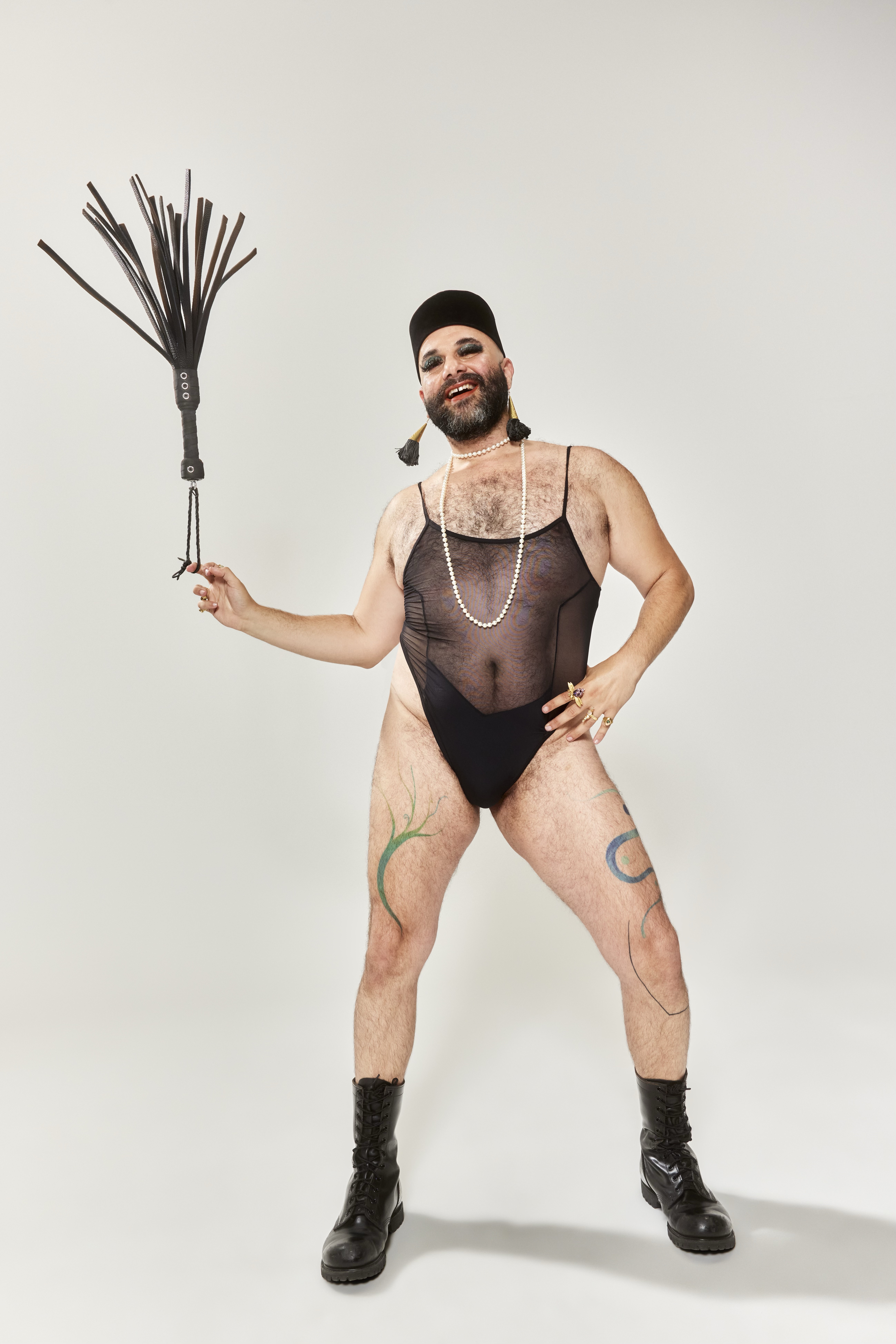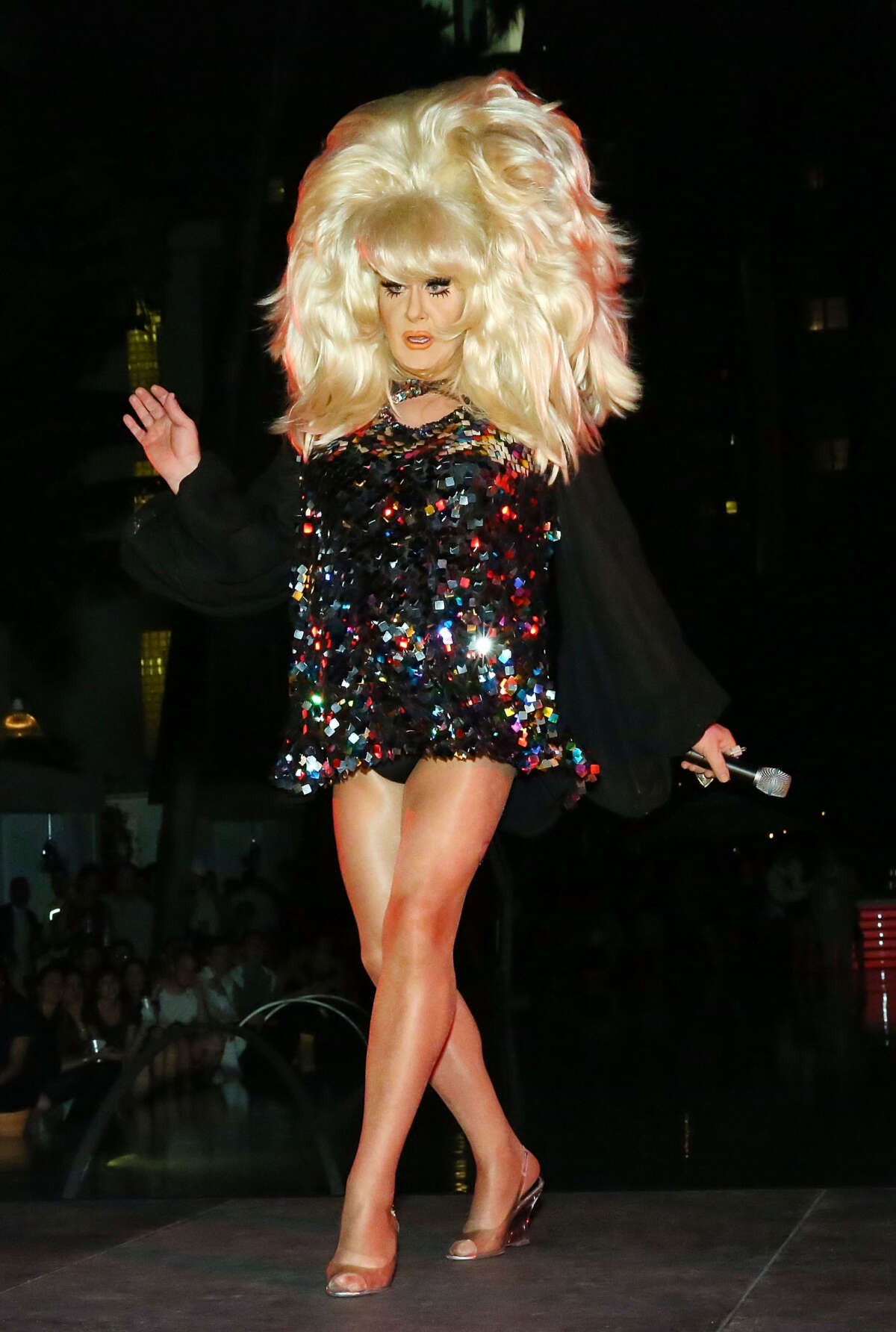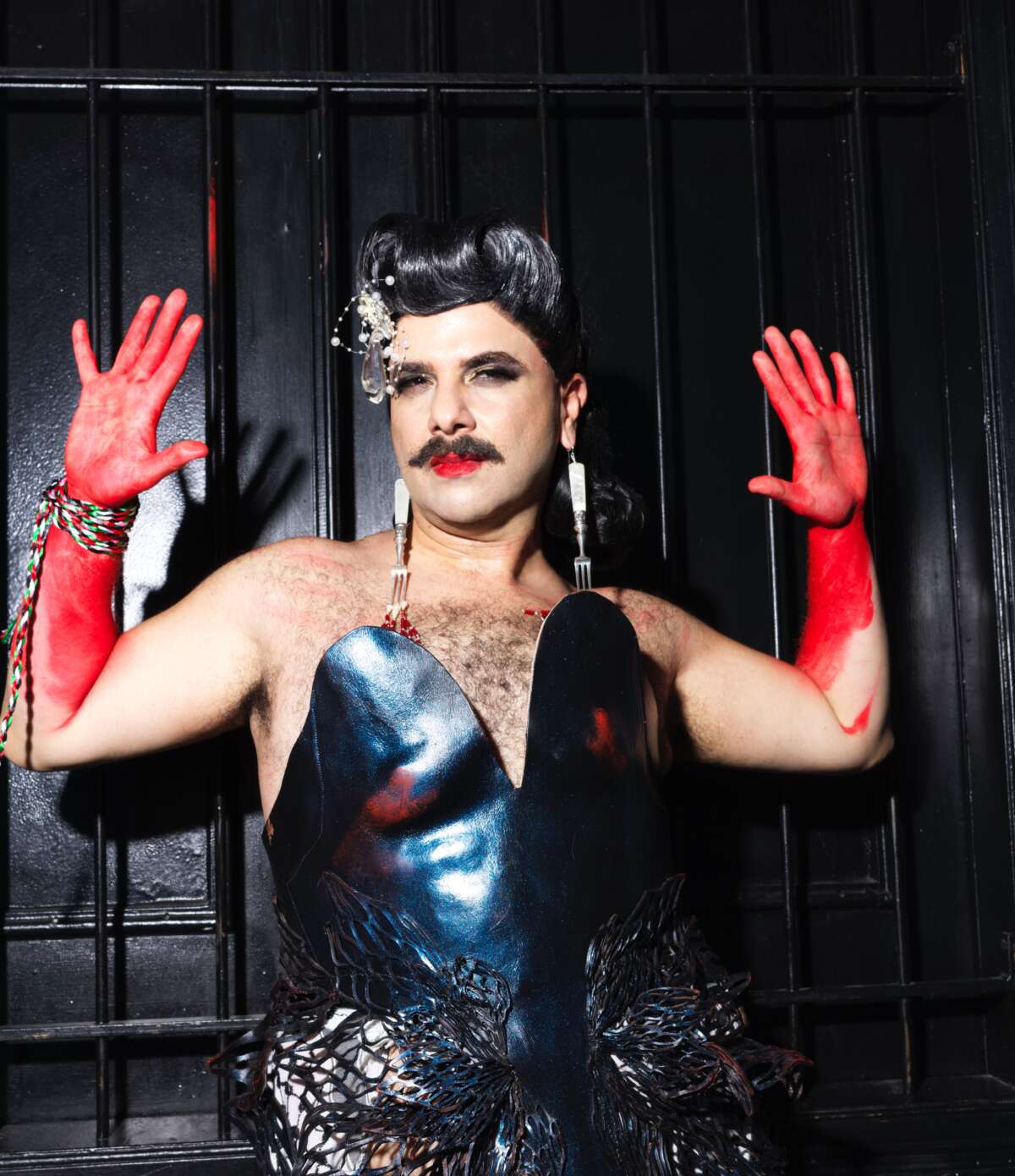At a recent pageant at the San Francisco Museum of Modern Art, Palestinian drag artist Mama Ganuush emerged onto the stage in a chain mail-and-mesh dress. As Gaza’s museums lie in rubble from Israeli bombs, cultural spaces like this in the United States have become battlefields in their own way, in a war involving several factions: Zionist funders, free speech activists and pro-Palestinians artists, to name a few.
During a breakdown in the Sade song “Soldier of Love,” Ganuush joined hands with nonbinary drag king King Lotus Boy and a quartet of backup dancers wearing keffiyehs. At the February 1 pageant, they led the audience in a chant that grew to echo beyond the gallery walls: “Free Palestine!”
Since Israel’s latest assault on Gaza began in October, Ganuush’s performances have focused primarily on one theme: the liberation of Palestine. They have incorporated the colors of the Palestinian flag, wall projections with words like ceasefire, resistance songs and, in a particularly moving performance, the sound recordings of Palestine under military siege, bombs blasting through the speakers.
“‘Queer’ means you’re radically supporting liberation for all people,” Ganuush said. “That’s what queer activism is for me.” And likewise, “drag in general is, for me, a form of a protest. It’s a ‘fuck you’ to social norms.”
Our first conversation happened for the podcast I host, Sad Francisco, after meeting Ganuush at a pro-Palestine action organized by Gay Shame and Queers Undermining Israeli Terrorism (QUIT) on December 2 — a die-in that shut down the busy Castro intersection for 45 minutes, while 100 or so queer and trans people got down on the asphalt as others moved between their bodies, outlining them with white sidewalk chalk. When we spoke, Ganuush had just returned from walking in New York Fashion Week after Brazilian designer Victor Puglielli asked them to fly out to model a dress in the show. They walked down the runway using a cane (they have multiple sclerosis), with a keffiyeh at their hip, hands and forearms painted blood red — a look they dubbed Palestinian punk rock.
In the 1960s, Ganuush’s father was imprisoned and tortured by Israel and Egypt for his ties to Marxist groups and the Palestine Liberation Organization (PLO), and their family was forced out of Gaza in 1967, to Cairo, where they grew up. After graduating from engineering school in Egypt, they moved to the U.S. in 2008 to be with their sister, making a home in the Castro gayborhood in San Francisco.
It was soon after early COVID-19 restrictions were lifted in 2020 when their drag mother in the city, Cassidy LeBlanc, helped them into a head-to-toe makeup look for a show at a bar in the Lower Haight district called Trax. “I never actually understood what body euphoria is until I put on drag makeup,” they said. “So that’s what drew me to drag, honestly — the exploration of my own gender.”
Ganuush said they have long been engaged in the Palestinian liberation struggle, but their commitment intensified as they watched the Israel-inflicted genocide unfolding late last year. Since October, they’ve been active not only on stage but also behind the megaphone at protest marches that bring out tens of thousands of people in the Bay Area.

Ganuush has had their accounts on both Instagram and TikTok banned, on and off, since October — bans that many Palestinian solidarity activists know are seemingly brought on by even the most basic content related to the genocide. To combat censorship and blacklists, in January they launched Heritage Artists and Liberation Activists (HALA) Collective, a network for artists who might face backlash for speaking out against the genocide. HALA Collective hopes to someday offer an emergency cushion of money for artists who lose work or gigs due to event cancellations spurred by Zionist groups like Canary Mission that target and dox Palestinians and their allies.
Ganuush has managed to pack the monthly art salons they host at Queer AF, a gallery and event space that once housed Harvey Milk’s camera store on Castro Street. Here, they’ve made a space for activists, artists and creators against the genocide — drag performers, yes, but also musicians, poets, chefs and hair stylists — to cross paths and talk intimately, in a way that isn’t often possible at a protest.
It’s hard to measure the importance of this kind of thing — the relationships and connections forged in a room full of people determined to end the genocide. As I left the most recent salon on March 14, Arab folk music from the Aswat Ensemble mixed with club music from the street outside. I sensed that everyone there would go out into the world and spread the message, like all good allies, to speak, as Ganuush hoped, “about the truth of Palestinians to other people that don’t know about Palestine, or have been getting a lot of dehumanizing messages from American institutions that are deemed ‘liberal.'”
The Monoculture’s Last Runway?
As social media algorithms silo us into our own micro-niches, drag is one of the few pop cultural touchstones that almost any LGBTQ+ sub-demographic in our fraying empire can use as a reference point. That includes conservatives, who love to use drag as a political fearmongering tool, as with recent attempts to use the specter of “big, bad” drag story hours to threaten public library funding, or criminalize abortion.
But if the monoculture is dying, somebody tell RuPaul. The “RuPaul’s Drag Race” universe extends, so far, to some 20 international spinoffs that include Belgium, Chile and Thailand, plus a whole universe of after-shows and podcasts where hosts dissect everything down to the contestants’ hairlines. Gay bars across the country host live airings that offer the closest thing to a sports bar experience for people who hate sports. Environmentalists took note when, in a 2020 NPR interview with Terry Gross, RuPaul inadvertently revealed himself as the first celebrity face in the fracking industry.
Palestine and drag were already intertwined on Reddit and X, formerly Twitter, when in January, a photo went viral showing an Israeli Defense Forces (IDF) missile with the names of drag queens who had expressed solidarity with Palestine written on it. Listed at the top was New York City scene legend Lady Bunny.
“RuPaul is political in the safest possible way, and maybe that’s what he’s teaching his minions to do … keep it real safe, keep it real blah. And then you’ll get your endorsement deals, and your influencer deals.”
Asked about the image, she seemed nonplussed: “You know, I never know what is and what isn’t [artificial intelligence].” But it’s clear that whatever the photo’s origins, its creator wasn’t a fan of Bunny’s outspoken views on politics. Long before Israel’s most recent assault on Gaza began in October, Bunny distilled the news for her hundreds of thousands of followers online, tempering the narratives of corporate media outlets with her wit, criticism and often rage.
Bunny told Truthout that she categorizes herself as “probably far left” on the political spectrum. Most drag celebrities nowadays are contestants on RuPaul’s Drag Race, which might explain why some choose to stay silent on the genocide, she said. “RuPaul is political in the safest possible way, and maybe that’s what he’s teaching his minions to do … keep it real safe, keep it real blah. And then you’ll get your endorsement deals, and your influencer deals.”
In spite of this, the list of “Drag Race” cast members who have taken a stand on Palestine is long, with several winners of the competition show publicly signing on to the Queer Artists for Palestine statement launched last December. In the statement, they called out pinkwashing, Israel’s attempt to cover its atrocities by appearing to be gay-friendly; aligned themselves with the boycott, divestment and sanctions (BDS) movement; and pledged not to perform or show any work in Israel. Fan-moderated social media accounts like celebrities4palestine, Falasteen Queens and Queens for Palestine track the latest news and tally up supporters.
Bunny and RuPaul moved from Atlanta to New York in the 1980s and shared an apartment in the city where they both quickly became fixtures of the nightlife and gay worlds. Their politics, however, aren’t in step. “Ru, and anyone supporting Joe Biden is center-right,” Bunny told Truthout. So if the most powerful name in drag is “creating queens in the image of him, well, he’s a person who votes center-right and fracks,” Bunny said of her ex-roommate.
For many years, Bunny “was always just a Democrat.” She volunteered her time, often DJing for mainstream gay causes. “It was like, I always did the AIDS benefits. I don’t have AIDS. I always did the gay marriage benefits. I don’t want to get married, ever. But I had up until that point just gone along with the flow.”

One moment of political awakening for her was watching a presidential debate back in 2008 between Barack Obama, Dennis Kucinich and Hillary Clinton. Gay marriage came up, and Clinton and Obama both said they didn’t support it. “When Dennis looked into the camera and said, ‘Yes, I support gay marriage, and I hope you’ll support me,’ I literally — even though I care nothing about gay marriage for myself — I burst into tears,” she remembered. “He did support us and none of us supported him. We let these gay organizations like the [Human Rights Campaign (HRC)], which are in essence conservative, do our thinking for us, and that has got to stop.”
Traditional, corporate media outlets so often pass the microphone to nonprofit executives and politicians — voices for the status quo who are quick to step in line to support genocide. Now, Bunny uses her platforms to call out the hypocrisy of politicians and organizations such as the HRC. “I don’t think they’ve been setting an agenda that speaks to me in any way,” she said. The HRC, which accepts money from weapons manufacturers, has been a target of queer pro-Palestine activists who, like Bunny and Ganuush, recognize liberation struggles are necessarily intertwined, for queer people, Palestinians and those who are both.
Behind the Bans
The streams of cash flowing to ban both drag and free speech on Palestine come largely from the same right-wing sponsors, led by Evangelical Christian Zionists and the Israel lobby.
For example, the keynote speakers at the November 14 March for Israel in Washington, D.C., included televangelist John Hagee, founder and chairman of the Christian Zionist organization Christians United for Israel, who once preached that Hurricane Katrina was God’s punishment for homosexuality. In another sermon, he said that the Antichrist will be revealed as a gay, “half-breed” Jew.
The streams of cash flowing to ban both drag and free speech on Palestine come largely from the same right-wing sponsors, led by Evangelical Christian Zionists and the Israel lobby.
Appearing on the same stage was current House Speaker Mike Johnson of Louisiana, whose most recent campaign received more donations from the pro-Israel lobby than any other industry. Alongside Israeli officials, Johnson addressed tens of thousands of attendees at the National Mall, saying “calls for a ceasefire are outrageous.”
Johnson spent eight years as a spokesperson and lawyer for the Alliance Defending Freedom (previously the Alliance Defense Fund), which exploits U.S. judicial and electoral systems to take down barriers between church and state. The Alliance has called for imprisoning LGBTQ+ people and provides lawyers and template language for many of the anti-LGBTQ+ bills currently littering state legislature offices.
Johnson’s first act as House leader was to pass a resolution that received near-unanimous support in Congress, affirming the U.S.’s special relationship with Israel, which he followed up with a motion to promote a $14 billion aid package for the apartheid state. Presumably, some of that money will circulate back to his next campaign.
Solidarity Takes the Stage
Nicki Jizz hosts a popular monthly party called Reparations at Oasis, a club in San Francisco’s South of Market district. The space was formerly a bathhouse and is owned by another San Francisco drag scene staple, D’Arcy Drollinger.
Jizz broadcast her first events online during quarantine in 2020, when every drag venue in the city was shut down. Four years later, some of those longstanding gay bars and clubs are no longer with us, but Reparations lives on, with a “come one, come all” vibe — tickets are free if you’re BIPOC and trans or disabled — that centers local queens rather than names associated with “Drag Race.” She spoke with Truthout over Zoom on March 5, the day that a TV show in which she co-stars premiered. Its title is a read on the current ubiquity of drag competitions in pop culture: “The Drag Queen of the Year Pageant Competition Award Contest Competition.”
Jizz emceed the February pageant at the SF Museum of Modern Art that featured Ganuush and King Lotus Boy. She pointed to that night as an example of how “every drag performance is a moment to let your hearts and thoughts and feelings out on stage for people.” It only makes sense that a lot of drag incorporates some nod to current news and cultural phenomena that are on the minds of performers and the audiences they’re communicating to, whether on stage or on social media. She encourages the performers at Reparations to use the stage to express whatever viewpoints they like, saying, “I’ve seen plenty of political numbers at this point. I’ll always take more,” then pauses for a few seconds, reconsidering. “Well, if someone was doing a number about veganism… I’m over it.” (We laugh when I mention I’m vegan.)
Zionist politicians, their corporate media backers and nonprofits like the HRC are trying hard to distract us from Israel’s extreme violence — with the U.S. as its top accomplice.
Their gaslighting techniques haven’t completely permeated drag culture, though, and Jizz is one of the queens working to keep it that way. Right now, “we’re seeing a lot of people who are afraid to say, out loud” where they stand, “because they don’t want to lose this or that.” But the reality is, “people are losing their lives. So what’s more important?”
